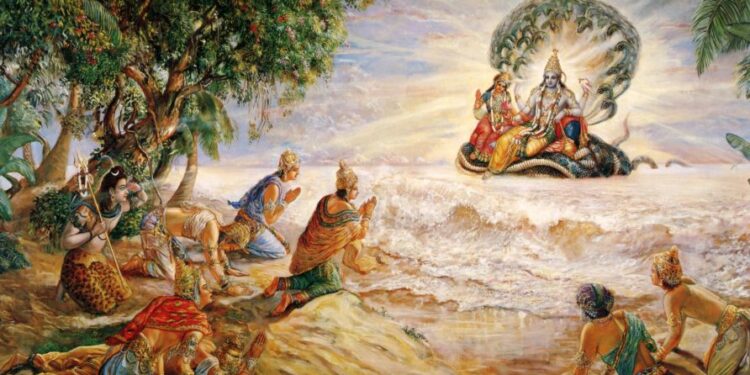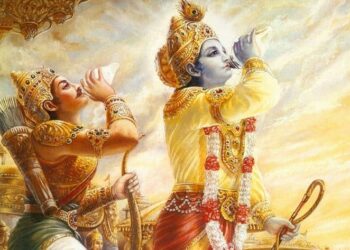The leader of the Yadu dynasty, King Śūrasena, was ruling over the country known as Māthura, wherein lies the city of Mathurā, as well as the district known as Śūrasena, which was named after him. On account of the rule of King Śūrasena, Mathurā became the capital city of all the kings of the Yadus. Mathurā was also made the capital of the kings of the Yadu dynasty because the Yadus were a very pious family and knew that Mathurā is the place where Lord Śrī Kṛṣṇa lives eternally, just as He also lives in Dvārakā.
Once upon a time, Vasudeva, the son of Śūrasena, just after marrying Devakī, was going home on his chariot with his newly wedded wife. The father of Devakī, known as Devaka, had contributed a sufficient dowry because he was very affectionate toward his daughter. He had contributed hundreds of chariots completely decorated with gold equipment. At that time, Kaṁsa, the son of Ugrasena, in order to please his sister, Devakī, had voluntarily taken the reins of the horses of Vasudeva’s chariot and was driving. According to the custom of the Vedic civilization, when a girl is married, the brother takes the sister and brother-in-law to their home. Because the newly married girl may feel too much separation from her father’s family, the brother goes with her until she reaches her father-in-law’s house. The full dowry contributed by Devaka was as follows: 400 elephants fully decorated with golden garlands, 15,000 decorated horses, and 1,800 chariots. He also arranged for 200 beautiful girls to follow his daughter. The kṣatriya system of marriage, still current in India, dictates that when a kṣatriya is married, a few dozen of the bride’s young girlfriends (in addition to the bride) go to the house of the king. The followers of the queen are called maidservants, but actually they act as friends of the queen. This practice is prevalent from time immemorial, traceable at least to the time before the advent of Lord Kṛṣṇa 5,000 years ago. So Vasudeva brought home another 200 beautiful girls along with his wife Devakī.
While the bride and bridegroom were passing along on the chariot, there were different kinds of musical instruments playing to indicate the auspicious moment. There were conchshells, bugles, drums and kettledrums; combined together, they were vibrating a nice concert. The procession was passing very pleasingly, and Kaṁsa was driving the chariot, when suddenly there was a miraculous sound vibrated from the sky which especially announced to Kaṁsa: “Kaṁsa, you are such a fool! You are driving the chariot of your sister and your brother-in-law, but you do not know that the eighth child of this sister will kill you.”

















